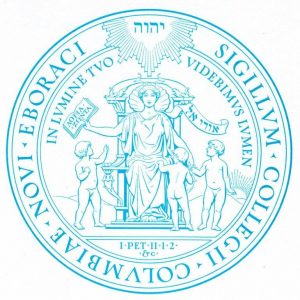
Samuel Johnson, The Seal of Columbia College, Photo Credit: Columbia University Archives.
Of what purpose are the Core’s religious texts to the resolutely irreligious? The notion that the works of the Core enable us to understand ourselves and our world is thrown around without substantive analysis or reflection; it’s no wonder, then, that so few seem to truly believe it. Even upon careful reflection, most would propose that the Core matters precisely because its authors set their sights on eternal truths by and through which all temporal truths must be judged, and are at least partially successful. We are thus able to understand ourselves, our world, and the relationship between the two by pondering such eternal truths with these authors and, by doing so, afford ourselves an intellectual arsenal to understand even the transient phenomena of the present. But this presupposes that the Core authors were at least in part successful in their quest for eternal truth. Why should one care about the Core, even if one thinks its works fail to grasp the truth in a thoroughgoing way?
If the aforementioned mechanism is indeed the only means by which we can learn profound truths about the world in contemplating works from ages past, then it would be impossible to justify to the resolutely irreligious individual why we ought to include texts like the Bible and the Qur’an in Lit Hum and CC. However, a careful understanding of the socio-intellectual development of history to the present moment and the ways in which we are embedded in the social world make clear a distinct mechanism that not only justifies including these books, but establishes them as the preeminent works of the Core, even to the irreligious.
We are irrevocably embedded in specific, formative conceptual traditions – our intuitions about good and evil, suffering and beauty, scientific and theoretical virtue and methodology, social and political justice, retribution and reconciliation, and even the nature of truth itself are informed by fundamental conceptual schemes that were, inter alia, implicitly passed to us through our parents, friends, mentors, and our examination of the world around us. These fundamental conceptual categories and presuppositions about the world, which in turn inform our most basic intuitions about how the world ought to be structured, have, and continue to drive history. Through literature, philosophy, art, and religion, authors throughout history have attempted to clarify and make explicit these archetypes, and these intellectual projects have in turn informed the nature and development of the archetypes themselves.
One might naively think that one can escape these archetypes – that one may, in radical independence – break free from the tyranny of the intellectual residue of Christianity, Judaism, Islam, and Greek philosophy, and even adopt a view of the world which is diametrically opposed to them. However, it is often in these moments that these archetypes reassert themselves most forcefully, even as one earnestly thinks one has escaped them. One cannot deeply understand contemporary secularism and its distinctive assumptions without understanding the Lutheran conceptions of Christian vocation and freedom out of which it developed, just as one cannot understand the spirit of capitalism without understanding the Calvinist doctrines of Divine Providence and the invisible hand from which it was born. Our central political intuitions are inherited from Christian principles of social equality, mediated by Kant, Locke, Hegel, Marx, and others. Our conceptions of numbers and abstract algebras in mathematics are inherited from Islamic stewardship of and improvement upon the insights of Diophantine arithmetic. Even our mathematical-physical assumptions in the natural sciences are the residue of a distinctly Christian-Islamic-Aristotelian uniformitarianism about nature. Finally, the notion that history linearly progresses towards a state of justice, and that an important step in reaching this state is collective reparation for an abhorrent historical transgression, is about as close as one can get to a Judeo-Christian conception of history without mentioning God.
Countless more examples may be cited; no one can doubt that the Bible and the Qur’an, as mediated through Jewish, Christian, Muslim, and secular artistic, philosophical, and literary traditions alike, have shaped the way we view and interact in the world in crucial, non-contingent ways, whether or not we recognize it. There are no texts that come close to matching them in influence, and all other works of the Core are essentially influenced or mediated by these two books, even if they temporally preceded them.
This makes clear a pivotal but widely unrecognized purpose of the Core: even if Christianity, Islam, and Judaism are all false, in studying them, along with the other foundational works of the West, we can come to understand some of our own most fundamental beliefs and assumptions, and we become explicitly acquainted with some of the most formative conceptual categories by and through which we all act in the world.
This understanding of the Core also demonstrates why contemporary works on the syllabi will not, in a comparable way, allow us to understand our present world. Counterintuitively, the most effective objects of study in this respect are texts over 2,000 years old, apart from which we would fail to reflectively examine the deepest assumptions behind the way our social institutions are configured. Through them, we come to understand explicitly what we already presupposed implicitly. Devout religious and irreligious individuals alike can see eye to eye on this profound virtue of the Core and its religious bent.
And, who knows? Perhaps, in discovering through the Core’s religious texts, what you already implicitly knew all along, you will, like me, even come to the conclusion that some of them can’t but be true.
